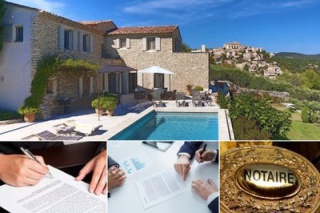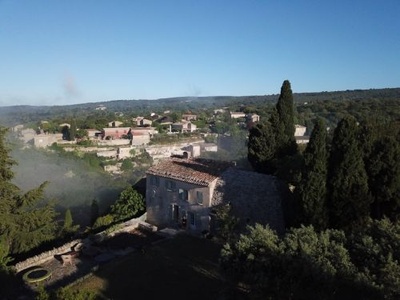Contact us
Send an email
Buy a property in France, especially in Vaucluse Luberon
What are the legal steps to buy a house in France and in Provence

The process of acquiring a property in France is not a simple exchange of letters, but it is structured in several stages.
1 / The promise to purchase or offer to buy
The first step is a "promise to buy", an offer written by the potential buyer. Although this step is not mandatory, it is generally done in case the initial price requested is not offered by the potential buyer. All you have to do is mention the property, its address, its area, any outbuildings (cellar, parking space ...) and the purchase price you offer. It is advisable to set an expiry date for the offer. Indeed, even if it is optional, the document commits you anyway. If the owner does not give his answer before the deadline, your offer lapses. If the offer is accepted on time and at the indicated price, the seller and the potential buyer (you) are required to sign a preliminary contract.
2 / The compromise of sale
After reaching an agreement on the main parameters of the sale, the parties sign a "sales compromise". The "compromise of sale" already contains the terms of the sale, and is already a fixed and firm contract for both parties. The signature of the agreement is accompanied by a deposit, "the capital allowance", of approximately 10% of the purchase price. By signing a sales agreement, you agree to acquire the property.
Following the signature of the agreement, the buyer has a ten-day "withdrawal period" during which he can cancel the contract (by registered mail with acknowledgment of receipt), without incurring legal disadvantages. The seller, however, can no longer withdraw from a "compromise" signed without just cause. After the expiry of the withdrawal period, the contract becomes binding on both parties.
At this stage, the buyer can no longer cancel the contract without losing his deposit. The deposit is, of course, fully taken into account in the purchase price at the time of sale. However, the compromis may contain a number of suspensive conditions (the "suspensive clauses") from which the validity of the contract depends. For the most part, these conditions relate to the buyer's ability to obtain financing for the purchase by a lender. In the event that such a condition is not fulfilled, the buyer has the right to abstain from the acquisition without contractual penalty.
3 / The act of sale
The signature of the final contract, the "deed of sale" or the "authentic deed", takes place before a notary in the presence of both parties. In France, the published selling price usually includes the commission of the real estate agent; The sales commission is paid by the seller. The contract of sale must include the address of the dwelling, its surface area, the description of all the parts and possibly sold furniture, easements, presence or absence of mortgage on the property sold, The name of the last-to-last owner and the notary's office, the various mandatory diagnoses (energy performance, lead, asbestos, termites ...), the expected date of entry, the price and payment terms.
However, it is the negotiation process that will determine the structure of the final agreement. In addition to the purchase price, the buyer pays in any case the notary's fees as well as registration fees (transfer taxes, registration fees, etc.) which represent about 10% of the purchase price.
The keys to your accommodation will be given to you as well as the property certificates that will serve you for your administrative formalities, such as enrolling children in school. The notary sends the bill of sale to the mortgage office, where it is published in the real estate file. As soon as he receives the "authentic copy" bearing the stamps of the tax administration, the notary will send you your title deed. He will retain the original. Between the signature of the deed of sale and the receipt of the title deed, it may take between three and six months.
1 / The promise to purchase or offer to buy
The first step is a "promise to buy", an offer written by the potential buyer. Although this step is not mandatory, it is generally done in case the initial price requested is not offered by the potential buyer. All you have to do is mention the property, its address, its area, any outbuildings (cellar, parking space ...) and the purchase price you offer. It is advisable to set an expiry date for the offer. Indeed, even if it is optional, the document commits you anyway. If the owner does not give his answer before the deadline, your offer lapses. If the offer is accepted on time and at the indicated price, the seller and the potential buyer (you) are required to sign a preliminary contract.
2 / The compromise of sale
After reaching an agreement on the main parameters of the sale, the parties sign a "sales compromise". The "compromise of sale" already contains the terms of the sale, and is already a fixed and firm contract for both parties. The signature of the agreement is accompanied by a deposit, "the capital allowance", of approximately 10% of the purchase price. By signing a sales agreement, you agree to acquire the property.
Following the signature of the agreement, the buyer has a ten-day "withdrawal period" during which he can cancel the contract (by registered mail with acknowledgment of receipt), without incurring legal disadvantages. The seller, however, can no longer withdraw from a "compromise" signed without just cause. After the expiry of the withdrawal period, the contract becomes binding on both parties.
At this stage, the buyer can no longer cancel the contract without losing his deposit. The deposit is, of course, fully taken into account in the purchase price at the time of sale. However, the compromis may contain a number of suspensive conditions (the "suspensive clauses") from which the validity of the contract depends. For the most part, these conditions relate to the buyer's ability to obtain financing for the purchase by a lender. In the event that such a condition is not fulfilled, the buyer has the right to abstain from the acquisition without contractual penalty.
3 / The act of sale
The signature of the final contract, the "deed of sale" or the "authentic deed", takes place before a notary in the presence of both parties. In France, the published selling price usually includes the commission of the real estate agent; The sales commission is paid by the seller. The contract of sale must include the address of the dwelling, its surface area, the description of all the parts and possibly sold furniture, easements, presence or absence of mortgage on the property sold, The name of the last-to-last owner and the notary's office, the various mandatory diagnoses (energy performance, lead, asbestos, termites ...), the expected date of entry, the price and payment terms.
However, it is the negotiation process that will determine the structure of the final agreement. In addition to the purchase price, the buyer pays in any case the notary's fees as well as registration fees (transfer taxes, registration fees, etc.) which represent about 10% of the purchase price.
The keys to your accommodation will be given to you as well as the property certificates that will serve you for your administrative formalities, such as enrolling children in school. The notary sends the bill of sale to the mortgage office, where it is published in the real estate file. As soon as he receives the "authentic copy" bearing the stamps of the tax administration, the notary will send you your title deed. He will retain the original. Between the signature of the deed of sale and the receipt of the title deed, it may take between three and six months.
The latest news





